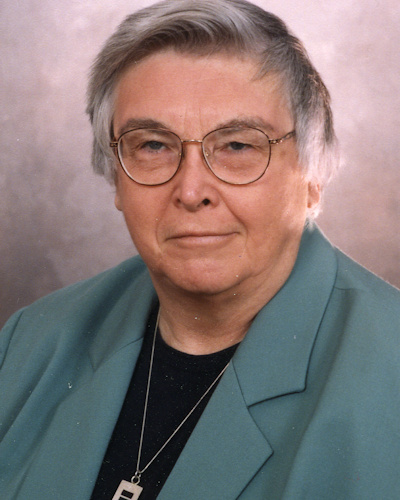
Virginia Ramey Mollenkott, Ph.D. Oral History
Part 1:
Part 2:
Part 3:
Part 4:
Part 5:
Part 6:
→ Transcript of Virginia Ramey Mollenkott, Ph.D.’s interview.
Biography
Virginia Mollenkott was born in Philadelphia in 1932 to a deeply religious family that attended the Plymouth Brethren Chapel. Her father deserted the family when Virginia was nine. Virginia, her mother and brother subsequently moved to a predominantly African-American section of Philadelphia. Virginia, one of the only white children in the school, became the target of her schoolmates' anger, as racial tensions erupted into riots during World War Two.
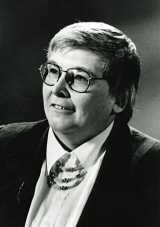 1993: Re-Imagining Conference, TV appearancesEven more alienating, when Virginia was eleven, her mother discovered she was involved in an ongoing lesbian relationship and sent her to a strict Southern Presbyterian boarding school. Her mother alerted the school staff of Virginia's "sinful" proclivities and the administration cautioned the students. While at boarding school, Virginia was crushed by an overwhelming sense of personal sinfulness and attempted suicide. Her suicidal depression was countered by a deep and abiding hope that God loved her, but she sought in prayer and Biblical reading to reconcile this emotional experience with teachings about her "sinful nature."
1993: Re-Imagining Conference, TV appearancesEven more alienating, when Virginia was eleven, her mother discovered she was involved in an ongoing lesbian relationship and sent her to a strict Southern Presbyterian boarding school. Her mother alerted the school staff of Virginia's "sinful" proclivities and the administration cautioned the students. While at boarding school, Virginia was crushed by an overwhelming sense of personal sinfulness and attempted suicide. Her suicidal depression was countered by a deep and abiding hope that God loved her, but she sought in prayer and Biblical reading to reconcile this emotional experience with teachings about her "sinful nature."
S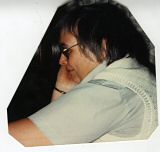 1984: Speaker, LGBT activisthe subdued her sexual longings when she attended Bob Jones University. She graduated with a B.A. in English Literature in 1953 and taught at Bob Jones while pursuing a Masters at Temple University. She married Fred Mollenkott, a fellow student at Bob Jones, on the advice of teachers that marriage would eliminate her homosexual feelings. The marriage was oppressive, but lasted over seventeen years, during which Virginia completed a master's degree at Temple and obtained a doctorate from New York University, while teaching at Shelton College, Ringwood, New Jersey and later Nyack Missionary College in Nyack, New York. She separated from Fred Mollenkott in 1967 and managed to retain custody of their son, Paul, then nine years old.
1984: Speaker, LGBT activisthe subdued her sexual longings when she attended Bob Jones University. She graduated with a B.A. in English Literature in 1953 and taught at Bob Jones while pursuing a Masters at Temple University. She married Fred Mollenkott, a fellow student at Bob Jones, on the advice of teachers that marriage would eliminate her homosexual feelings. The marriage was oppressive, but lasted over seventeen years, during which Virginia completed a master's degree at Temple and obtained a doctorate from New York University, while teaching at Shelton College, Ringwood, New Jersey and later Nyack Missionary College in Nyack, New York. She separated from Fred Mollenkott in 1967 and managed to retain custody of their son, Paul, then nine years old.
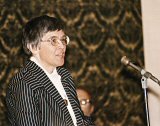 1974: LecturingShe left the fundamentalist Nyack College and began teaching at a state university, William Paterson University of New Jersey. She described her relationship with students as a forty-four year love affair–"I loved them, and they loved me." During this time, Virginia came to new understanding of the Bible, interpreting it with all the skill and hermeneutics she knew as doctor of English literature. In the Bible, she found a message of love and tolerance radically different from the rigid fundamentalism of her childhood church. Her reinterpretation of the Bible opened the way to reconciling feminism and her lesbian identity with Biblical teachings.
1974: LecturingShe left the fundamentalist Nyack College and began teaching at a state university, William Paterson University of New Jersey. She described her relationship with students as a forty-four year love affair–"I loved them, and they loved me." During this time, Virginia came to new understanding of the Bible, interpreting it with all the skill and hermeneutics she knew as doctor of English literature. In the Bible, she found a message of love and tolerance radically different from the rigid fundamentalism of her childhood church. Her reinterpretation of the Bible opened the way to reconciling feminism and her lesbian identity with Biblical teachings.
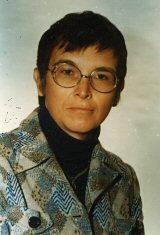 1974Virginia became active in left-leaning evangelical organizations. Beginning in November of 1975, she was a speaker for and member of the newly formed, feminist organization, Evangelical Women's Caucus (renamed the Evangelical and Ecumenical Women's Caucus in 1990. Continuing to meld her Biblical beliefs with feminist and radical interpretations of the Bible, she co-authored Is the Homosexual My Neighbor? with Letha Scanzoni. As a result, she was invited to speak at theological seminaries around the country–sometimes when the more conservative institution wanted to present "the full spectrum" of positions on homosexuality and reproductive freedom. She has written, co-authored or edited more than thirteen books and numerous articles. Still closeted, she was appointed by the National Council of Churches to the Inclusive Language Lectionary Committee and made a major speaker at the Families 2000 Conference in 1996. Privately, she found identity and community with LGBT denominational organizations, with leaders like Carter Heyward, John McNeill, Troy Perry, Nancy Wilson. Inge Lederer Gibel of the American Jewish Committee was her mentor in the Inter-Religions Dialogue.
1974Virginia became active in left-leaning evangelical organizations. Beginning in November of 1975, she was a speaker for and member of the newly formed, feminist organization, Evangelical Women's Caucus (renamed the Evangelical and Ecumenical Women's Caucus in 1990. Continuing to meld her Biblical beliefs with feminist and radical interpretations of the Bible, she co-authored Is the Homosexual My Neighbor? with Letha Scanzoni. As a result, she was invited to speak at theological seminaries around the country–sometimes when the more conservative institution wanted to present "the full spectrum" of positions on homosexuality and reproductive freedom. She has written, co-authored or edited more than thirteen books and numerous articles. Still closeted, she was appointed by the National Council of Churches to the Inclusive Language Lectionary Committee and made a major speaker at the Families 2000 Conference in 1996. Privately, she found identity and community with LGBT denominational organizations, with leaders like Carter Heyward, John McNeill, Troy Perry, Nancy Wilson. Inge Lederer Gibel of the American Jewish Committee was her mentor in the Inter-Religions Dialogue.
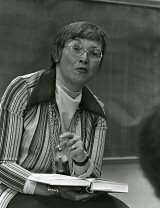 1970s: Teaching at
1970s: Teaching at
Gordon CollegeHer process of coming out publicly as a lesbian in the evangelical and academic community spanned many years. Beginning in the mid-1970s, she began attending a conference for lesbian and gay Christians at Kirkridge Conference and Retreat Center and was a featured speaker the next year and every year since. She has led gay/lesbian/ bisexual/transgendered workshops there since 1979.
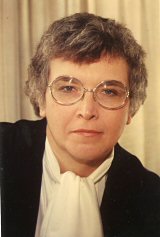 1979: GLBT work at the
1979: GLBT work at the
Kirkridge CenterMollenkott served as Stylistic Consultant for the New International Version of the Bible, and as a member of the National Council of Churches' Inclusive Language Lectionary Committee, coming out to the NCC convention in support of the Metropolitan Community Church's application for membership. She has guest lectured at hundreds of universities, church conferences and seminaries, and testified on behalf of the New Jersey anti-discrimination law, receiving a 1992 Achievement Award from the NJ Lesbian and Gay Coalition. In 1999, SAGE (Senior Action in a Gay Environment) presented her with a Lifetime Achievement Award for her work of combating heterosexism in religion.
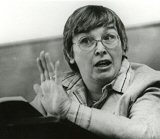 1970s: Advocating for feminism and gay ChristiansMollenkott has served as Board Member for various GLBT-friendly organizations, including Evangelicals Concerned, The Center for Sexuality and Religion, and Kirkridge Retreat Center, where for many years has led several GLBT events annually. She is a founding member of the GLBT-inclusive Evangelical and Ecumenical Women's Caucus.
1970s: Advocating for feminism and gay ChristiansMollenkott has served as Board Member for various GLBT-friendly organizations, including Evangelicals Concerned, The Center for Sexuality and Religion, and Kirkridge Retreat Center, where for many years has led several GLBT events annually. She is a founding member of the GLBT-inclusive Evangelical and Ecumenical Women's Caucus.
Among her twelve books, the most explicitly lesbian is Sensuous Spirituality: Out From Fundamentalism, although lesbians have also enjoyed The Divine Feminine: Biblical Imagery of God as Female. Her most recent and most radical work, Omnigender: A TransReligious Approach, won the 2002 Lambda Literary Award in the bisexual/transgender category.
Virginia Ramey Mollenkott died on September 25, 2020.
(This biographical statement written by Doris Malkmus from an interview with Virginia Mollenkott with additional information program by Mollenkott.)
Biography Date: August, 2002
Additional Resources
Recording of online gathering, Celebrating the Legacy of Virginia Ramey Mollenkott, held on February 14, 2021: https://www.youtube.com/watch?v=SfT5CLVs3k4&t=18s
Letha Dawson Scanzoni wrote this article, "Virginia Ramey Mollenkott, My Co-Author, My Friend: A Special Remembrance", published in Christian Feminism Today.
Titles
- Adamant and Stone Chips, 1967
- In Search of Balance, 1969
- Adam and the Television Trees, 1971
- Women, Men and the Bible, 1977 (rev. 1988)
- Speech, Silence, Action: The Cycle of Faith, 1980
- Is the Homosexual My Neighbor? A Positive Christian Response, 1978 (rev. 1994)
- The Divine Feminine: Biblical Imagery of God as Female, 1983
- Views from the Intersection, 1984
- Women of Faith in Dialog, 1987
- Godding: Human Responsibility and the Bible, 1987
- Sensuous Spirituality: Out from Fundamentalism, 1992
- Omnigender: A Trans-Religious Approach, 2001
- Transgender Journeys, 2003
Autobiographical accounts can also be found in:
- Virginia Hearn, Our Struggle to Serve: the Stories of 15 Evangelical Women, 1979
- Speech, Silence, Action: The Cycle of Faith
- Divine Feminine Biblical Imagery of God as Female, 1983
- Transgender Journeys, chapter 4
- Anne Braude, Transforming the Faiths of Our Fathers: Women Who Changed American Religion, 2003 essay by Mollenkott
- Online audiovisual recording of her talk at the 2003 Women and Religion conference, sponsored by the Women's Studies in Religion Program at Harvard Divinity School. Follow the links to Videos of Speakers>>Panel III.>>Virginia Mollenkott.
Profiles:
Archival Collections:
Tags
Evangelical | Evangelical & Ecumenical Women's Caucus | Author/editor | Feminism | Theology | Trans activism | Women and Religion | Mollenkott, Virginia Ramey
Citation
“Virginia Ramey Mollenkott, Ph.D. | Oral History”, LGBTQ Religious Archives Network, accessed February 28, 2026, https://lgbtqreligiousarchives.org/oral-histories/virginia-ramey-mollenkott-ph-d.